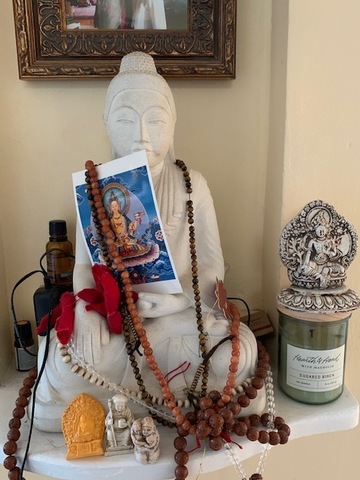
My car just ranked my driving ability, and I sigh with a familiar anxiety. 65/100 going to the grocery store but it was 45/100 on the freeway. Sub-par. I'm failing.
My point is that we're being measured every day in new and surprising ways. Spending time and money striving for likes, friends, followers and approval. Striving for more money as a measurement of success and value. Book sales. Stars. Less weight, more collagen, a measure of correct living and moderation. A hipper kitchen that reflects our cool factor. The latest car. The correct political understanding. Even our humor is too often the judgmental and "subtle cruelties that pass for wit," as Dorothy Parker said.
There's No Yardstick in Buddhism
What do all these measurements have in common?
They are relative. They are not absolute, not based in fact or science.
Good, better, best are all relative.
True, the car dashboard measures scientific conditions, but the value judgement I attach to that number re: my own personal value is relative and hollow.
Measurements like "thin enough" or "successful" are constructs of the mind, and so imminently mutable, able to change as we change our minds. For example, the enemy who becomes a friend when you hear they've said something nice about you. An insult that turns out to not be sweet after it's explained. One person's beloved folk tune is another's nails on the chalkboard. Terrible food that one loves because it's the way your mother used to cook.
For example: am I wealthy? I am wealthier than some and less so than others, so am I wealthy? Yes. Am I pretty? Less so than some, more so than others so am I pretty? Yes.
An irritation driven by a sound, smell, taste or a person can be addressed by just altering your mind. All preferences and irritations are simply mental constructs and so can be changed with a voluntary re-adjustment. One of the things that I love the most about Buddhism is that it is a spiritual and philosophical belief that when all things are relative, all things are equal, and all things being equal means that there is no purpose in a yardstick. Measurement loses its sting.
Peace of mind can be found in understanding that all of these yardsticks with which one measures oneself (guilt, shame, wasteful, a loser, poor, fat, stupid etc.) are relative and therefore changeable. Understanding this relativity leads to a sense of equanimity.
The eastern philosophy suggests that the root of all suffering is desire. I would suggest that in this world the root of all suffering is measurement. Ranking. First-class, second-class citizens. Oppression of all forms that are founded on the belief in The Other, (initially coined by Simone de Beauvoir.)
This doesn't mean that there isn't a celebration of differences, it means that those differences are all held to be equally precious, and socially equal expressions of cultural joy.
It is my belief that Buddhism is the spiritual, religious, and philosophical belief in ultimate equality.
The Buddhist Wisdom of Mary Poppins
The Eastern nomenclature calls this condition of relativity 'the truth of emptiness' but the Western mind is terrified of emptiness (maybe everyone is, I don't know.) But this equality and relativity can just as easily be explained as abundance.
"Enough is as good as a feast," a great Buddhist philosophy, spoken by Mary Poppins.
You are already enough. You have enough, you are enough. 'Enough is as good as a feast' drives to the heart of the idea of scarcity. And this is a great Western disease, this feeling of always needing more, of being focused on scarcity and the endless treadmill of more. The hedonic treadmill.
(Apathy is another matter, however: it is a very different emotion and is contrary to Buddhist thinking IMHO. Apathy is a refusal to appreciate the beauty of life and so is a form of ingratitude.)
No Ruler, No Yardstick
Buddhism is the only great religion in which there is no Creator God. Life brought forth life through the scientific process of biology and physics. We are part of a cosmic consciousness of individual energy points, each of us equal and in charge of our own reincarnations past present and future, based on our karma. As such, there is no hierarchy that is not artificial, no hierarchy that is not made up in the human mind, and so an inherently false ranking.
So, no yardstick in the sense that measurement of values. And there is no ruler in the sense of a Lord on high.
No yardstick, no ruler.
And Yet We Strive for Excellence
So, in the past I have asked Buddhist thinkers: why should we strive for excellence in anything, like art, medicine, and social development? They tell me it's because these are gifts we have been given and we owe it to the work of our past lives, and others in the current timeframe, to use them, improve them, make the world a better place with them. While measurements like 'fame' and 'success' are empty, one works hard for the sake of the art and humanity. Art is a form of sharing, giving. One works hard on medicine for the sake of humanity etc.
No yardstick, no ruler, but a dedication to humble excellence.